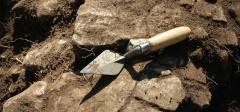Employers and Universities: Work with us?

60 Second Interview: Forensic archaeologist

Name: Dr Caroline Sturdy Colls
Employer: Staffordshire University
Industry: Science and research, archaeology, forensic investigation, education and teaching
What is your job? Associate Professor of Forensic Archaeology and Genocide Investigation and volunteer STEM ambassador
How long have you been doing this job? 5 and a half years
Education
University: University of Birmingham
Degree subject: PhD archaeology (Holocaust archaeology), MPhil(B) archaeological practice, BA(Hons) archaeology and ancient history
1. What was your very first job?
I started working at Staffordshire University as a lecturer in forensic investigation in 2010, whilst still completing my PhD.
2. What did you want to do when you were at school?
When I was at primary school, I wanted to be an archaeologist – specifically an Egyptologist actually. I was always fascinated with Tutankhamun and the ancient Egyptians. For a time, I also wanted to be a police officer, which possibly explains why I went into forensic archaeology. At high school, I also went through phases of wanting to be a journalist and a history teacher. As I now do TV documentaries, teach and specialise in the Holocaust, I suppose my job includes some of these subjects too!
3. How did you find out about the industry?
I found out about forensic archaeology because the professor who supervised my first ever archaeological field school specialised in forensic archaeology. He worked with the police in the UK and out in Bosnia and Iraq, and I was fascinated by his job. I took his class in forensic archaeology and then I immediately knew that this was the area of archaeology I wanted to specialise in.
4. How did you get there?
After taking some modules in forensic archaeology and writing my dissertation on forensic archaeological approaches to cold case reviews at undergraduate level at university, I went on to do a master’s and a PhD in archaeology. I decided to specialise in the application of forensic archaeological methods to the investigation of the Holocaust during my master’s degree.
I think the main reason I got where I am today though is because of the extra experience I gained alongside my university studies. I was fortunate enough to work alongside my professor at university on a number of police cases and I also did a lot of voluntary work on archaeological digs in the UK and abroad to gain more field experience.
5. What is a typical day like?
There is no typical day with my job! One day I can be teaching students at the university, another I will be out on fieldwork, often in Poland. I also do a lot of guest lecturing and speaking at conferences so this takes me all over the world.
I now also run the Centre of Archaeology at the university so I do a lot of consultancy and research work – this often takes me to London or to countries in Europe, such as the Netherlands, Germany, Poland and Serbia.
This year, I will be out in Washington DC on a fellowship at the United States Holocaust Memorial Museum, researching for and writing a book about Treblinka – a Nazi extermination camp and a labour camp about which I have been conducting research for the last eight years. So my work is never boring because it is so varied.
6. What’s the best thing about your job?
I love the variety and the chance to make a real difference by finding out information about past crimes.
7. What is the most challenging thing about your job?
My job can be emotionally very challenging because I am mainly working on missing persons cases or historic cases of genocide.
8. What advice do you have for people who want to do what you do?
The best advice I can offer is try and get lots of extra experience to make your CV really stand out. Try and get some experience doing things that other people who want the same career as you might not have. Volunteering is a great way to meet new people and learn new skills. Try asking people if you can do a placement or volunteer, even if you think they might say no!
I asked a forensic archaeologist if I could get some experience by shadowing them on case work when I was at university and I never thought they would say yes, but they did and that’s probably why I am doing the job I am doing now!
9. What things do you wish you’d known before starting your career?
Nothing - that way every day is a surprise!
10. Where would you like to be in 5 years?
In five years I would like to be a full professor!
If like us, you think Caroline's job sounds really exciting, why not find out more about STEM subjects and where they could take you in your career?
More help for you
Jobs and courses in science and research
